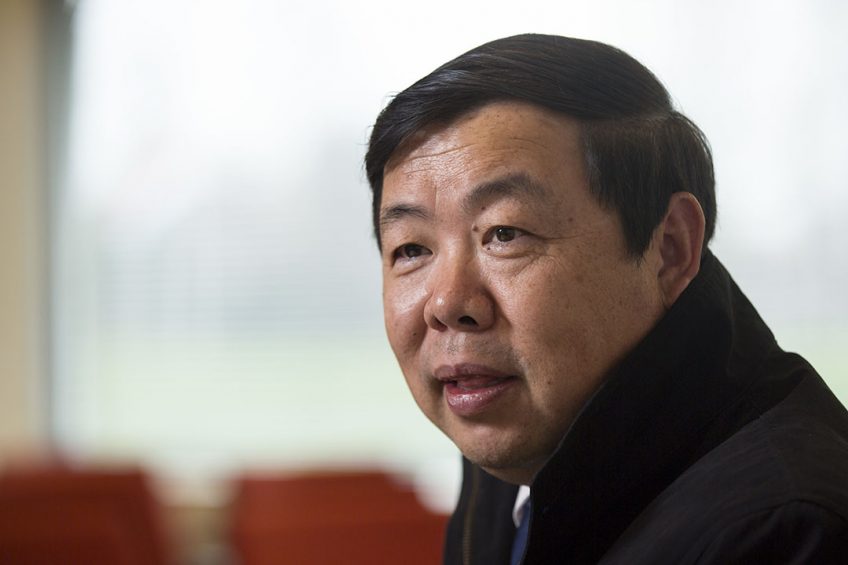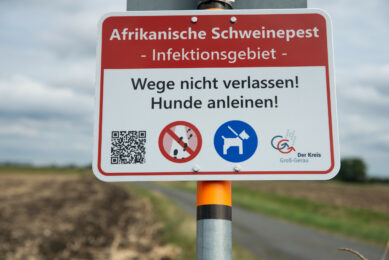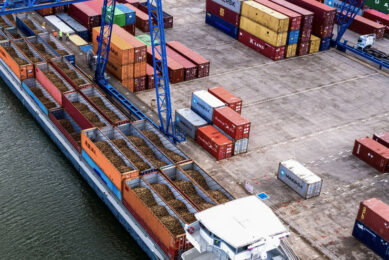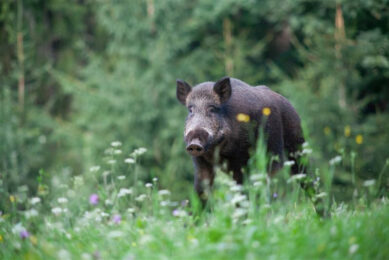Yingzi’s CEO talks about monitoring much more than just pigs

Chinese companies have, at a rapid pace, started to develop advanced technology to monitor, measure and manage everything in the pig house – including pig facial recognition technology. Yingzi Technology is one of them – led by Dr Jackson He, an ambitious US entrepreneur with Chinese roots.
Imagine a computer system that could manage 1 million sows. And now imagine that it is likely to be achieved by an IT company which has only been around for 3 years… this could only happen in one place in the world: China.
One of the main drivers behind that development is Dr Jackson He, 55, a Chinese-born entrepreneur who left his motherland for a future in the United States to become an expert in information technology. After all the experience he gathered during his PhD at the University of Hawaii and during a quarter of a century at IT company Intel, he started a completely new adventure in Guangzhou, China: he initiated Yingzi Technology.
|
Agriculture presented best opportunities
In his last years at Intel, Dr He was based in China, which allowed him to get an idea of the opportunities the country had to offer. “Agriculture presented the best opportunities for me to start up a business,” he says. “Mr Yang, of Yangxiang (a large pig producer, ed.), was looking for a partner to start new adventures with. We actually found this mutual interest and that’s what helped us to become more focused on agriculture and then pig farms.”
All this eventually led to the establishment of Yingzi in 2017. He founded the company using an initial capital investment of about 100 million RMB (€ 13million). With the aim: the creation of an online platform for data-driven agriculture which has since developed into a company with over 200 staff – and counting. With various well-staged media events, new technologies like pig facial recognition and the ‘Future Pig Farm’ (FPF) were announced.
Jumping out in the Yingzi philosophy is the concept of individual swine identification. Dr He says, “There is a general belief that, if you have customised plans, it’s better than having massive plans. When you look at the health care industry, they also want to identify individuals, so that they can develop treatment plans for them. The philosophy of this modern IT technology is to create more customised plans for individuals.”
In a swine farm, the first focus with identification should therefore be with breeding animals, Dr He explains. “The sow is the most valuable investment a pig farm has. That means starting with individual feed plans, and focus on sows means that it will be the most effective in terms of driving a higher pigs per sow per year (PSY) and also lower death rate of piglets.”
Pig facial recognition technology
As a means of identification, Yingzi aims for facial recognition technology, using cameras and machine-learning software, a method that is being developed and improved at a rapid pace. Dr He says, “For finishing pigs, in China I do see there is a potential value in it, as that means when you move livestock from pig farms to slaughterhouses, the intrinsic value is that you actually have traceability. In China the business environment is not as honest as in the Western World. I have heard stories about in the way of moving livestock from point A to point B, that people are actually cutting corners and stop at point C and swapping pigs. And ear tags can be cut out and be swapped as well…”
With face recognition in humans, the Chinese have advanced rapidly in recent years, helped by the absence of strict privacy legislation like in the European Union. At China’s high speed train stations, for instance, identification happens through automatic face recognition. Dr He says, “Definitely the whole idea of human face recognition inspired the pig facial recognition. In a way it is machine learning, we are using the same neuro-network models and tools. That is what they have in common, but in terms of applications, it is totally different.”
In fact, Yingzi is not even the only company focusing on pig facial recognition technology. Dr He sums up at least two companies following similar paths in China, being JingDong (JD.com) and Alibaba. Dr He says, “From a pure technology perspective, I cannot say we are superior than them. But we are ahead of them, at least by a few months, if not longer, because we are working with Yangxiang very closely, so we are closer to a real pig farm, and thus getting more raw data. On top of that, serving the pig industry is the only business we are working on. We are much more responsive to customer needs than the others, as they are more established internet companies. They want to do internet plus other businesses. For them, getting into pig farming business is not as critical as it is for Yingzi. For them, it could be a ‘nice to have’ business.”
Future Pig Farm
Pig facial recognition is only ‘one part of the puzzle’, as Dr He puts it. In October 2018, Yingzi announced its ‘Future Pig Farm’ (FPF), a multifaceted platform with input from many different sides to make any development in the pig farm easy to monitor and manage.
Apart from facial recognition, currently the system includes 5 key elements:
- genetic matchmaking
- precision feeding
- environmental control
- biosecurity
- livestock management
Yingzi does not do that on its own, as it applies, harmonises and implements technology of others to make things work better. For instance, for environmental control, the company cooperates with Dutch-based Microfan and for livestock management, Yingzi will make use of knowledge and technology by Nedap, also from the Netherlands. Dr He says, “We are trying to find complementary areas, after all we are serving the same customers: pig farms. We are looking at where we have values and where they have values, and where we can make this 1+1 even bigger.”
More than just the individual pigs
What can be measured, monitored and managed is much more than just the individual pigs, explains Dr He: “We always say: we actually put the pigs, the people, the materials, and the pig farm itself on the internet. To give an example: The bio-safety is built ‘into’ the task management system. We actually push tasks onto the workers in the pig farms and we also give them alerts. This alert actually could be seen by the managers, so if the workers are not doing what they are supposed to do, they will get red dots, that is really linked to the compensation system.”
Political and economic outlook
The future looks bright for Yingzi as Dr He speaks of a ‘new tide’ in Chinese politics that looks favourable for the company. It is a change in thinking as to where to put the emphasis in economic development, he says. Ever since Deng Xiaoping became leader of China, in 1978, his motherland has been developing at a very rapid pace. Dr He explains, “In the 40 years since, there has been so much focus on the industrialisation of the country and on manufacturing and progressing import and export, especially on developing products for exports and that has really helped China to become the second largest economy in the world.
He continues, “Now they are saying that, because of the focus of the first 40 years the rural areas have probably been left out. In some cases urban development happened at the cost of the rural areas.” In short, ‘rural renovation’ is the buzzword for the years to come in China.
Future perspectives for FPF
For now, the FPF technology is only available in Chinese, targeting medium and large-sized pig farms, i.e. between 500 and 5,000, and up to 20,000 sows in China. The aim is that the return of investment of the system, which can be managed all from a smartphone, should be within a year.
In 2019, Yingzi have a spending budget of several hundred million RMB. Thinking ahead, Dr He is keen to acquire international venture capital for further expansion in the future. He says, “We are trying to establish this system and demonstrate its feasibility. If we would ever come to Europe or other geographical areas, then it will be in 2021. Give us two years, then we will be able to tell whether FPF is viable in China.”
Should all work well, then eventually the entire production chain can be covered, right from breeding all the way to retail. In addition, other types of livestock may also be interesting, Dr He continues.
For now, conquering the Chinese market is a task in itself. After all, the country has half the pigs in the world. Dr He says, “I think it is nearly 200,000 sows that we targeted to manage now. Yangxiang is currently our key customer, having 100,000 sows alone. But we are still at the beginning of the journey. We want to serve a million sows by the end of this year. Helping and managing those sows, that means we could be the number-one pig service provider in China. Just think about it. This could be very exciting.”
Dr Jackson He was keynote speaker at the event ‘Higher Pig Health’, held in Eindhoven, the Netherlands, in January 2019. This event was organised by Boerderij, the Netherlands’ leading agricultural title and a sister publication to Pig Progress.
Co-author: Kees van Dooren, reporter, Boerderij


 Profile
Profile








